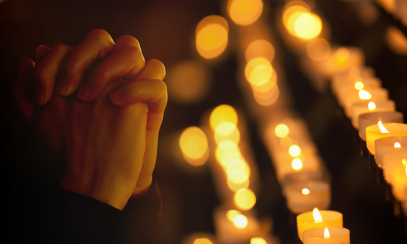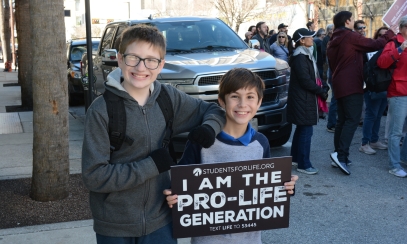
Welcoming People With Special Needs: All Parishioners Have a Role to Play
After Mass one day, a woman turned to Rachel Harig and smiled.
“You’re so brave to bring your children,” she told the mother of three. “And we’re so happy you’re here.”
Kind words like those can make a difference for young families, particularly those with children with special needs, Rachel says. She and her husband, Joshua, are the parents of RaeLynne, 7, Liam, 5, Trinity, 20 months, with another child on the way.
Liam, a happy boy with an infectious laugh, was diagnosed with nonverbal autism spectrum disorder at age 2. His parents had noticed he had not spoken his first words, would stare off and had a hard time staying still. The diagnosis led Joshua, who was raised in a Catholic family but had never been baptized, and Rachel to delve deeper into their faith.
Joshua visited St. John Paul II Parish in Cedar Springs, Mich., which happened to be closest to their home. The pastor invited the family to Mass and enthusiastically encouraged them to join the parish. The entire family was baptized at the Easter Vigil in 2019.
Today Rachel is a cantor and Joshua serves as an usher, assisted by Liam and his big sister. The children attend religious education classes together. And other parishioners offer to sit with the kids if their parents are occupied. “I’ve never been to a parish that is so understanding and so welcoming,” says Rachel.
In addition to that sense of community, St. John Paul II provides a quiet area with a “sensory bin” that contains pop-it toys, flip books and picture schedules that help children follow along. The parish also is making plans to offer a monthly sensory friendly Mass – featuring calmer music, softer lighting and a shorter homily.
The Harigs’ experience at St. John Paul II shows what can happen when a parish embraces the U.S. bishops’ call to ensure that people with disabilities and their families can fully participate in the sacramental life of the Church.
In 2017, the bishops issued Guidelines for the Celebration of the Sacraments with Persons with Disabilities. The guidelines affirm that “Catholics with disabilities have a right to participate in the sacraments as fully as other members of the local ecclesial community.”
The document also calls upon parishes and pastors to reach out to adults with disabilities and the parents of children with disabilities. “The creation of a fully accessible parish reaches beyond mere physical accommodation to encompass the attitudes of all parishioners toward persons with disabilities,” the bishops wrote. “All members of the faith community have a role to play in the invitation, welcome, and inclusion of people with disabilities.”
The bishops acknowledge that the pastoral response to people with disabilities can be inconsistent. The Harigs experienced that firsthand when visiting other churches. “I’ve been to places where if our kids were getting a little loud or rambunctious, they would give a look – not a nice, friendly look,” Rachel recalls. “All it takes is one person to give (a family) a negative feeling and they might not come back.”
In an article for Parable Magazine, a publication of the Diocese of Manchester, New Hampshire, columnist Simcha Fisher gives Catholics advice on “What the special needs parent in the next pew would like you to know.”
She writes: “Talk to people with special needs, or at least smile at them … Special needs kids and their families simply want to feel like they belong, just the same as any other Catholic who takes it for granted that there is a space for them in the pew.
“If you see a special needs parent struggling, you can always ask if they need a hand. And you can’t go wrong with offering a simple word of encouragement, such as, ‘You’re such a good parent,’ or ‘You’re doing such a good job’ or “I love seeing your family here.’”
In addition to full participation in the liturgy, the U.S. bishops’ guidelines call for inclusion in faith formation and religious education classrooms. “Parish catechetical and sacramental preparation programs may need to be adapted for some parishioners with disabilities, though, as much as possible, persons with disabilities should be integrated into the ordinary programs,” the bishops wrote.
At St. John Paul II, Rachel and Joshua had considered waiting a year or two to enroll Liam in faith formation – “he can be a little distracting,” Rachel says. But the director of faith formation encouraged her to bring Liam. “She fell in love with Liam immediately, and we knew we were in the right place,” Rachel recalls.
The parish adapted its religious education curriculum so that an eighth-grader with Down syndrome could participate and be confirmed. Children and adults with special needs share their talents as altar servers and greeters, as well.
Rachel has been amazed at Liam’s growth since he was baptized and began attending Mass. “We all have our gifts. Liam has just as much of a right to be there as anyone does. Kids like Liam can really thrive in a church setting,” she says.
To help that happen, she recommends that people educate themselves about disabilities and make room in the pew for all. “Just to be kind – that’s super important,” says Rachel. “Always be kind. You don’t know what it’s like for someone else.”
Quotations from Simcha Fisher reprinted with permission from Parable, the magazine of the Diocese of Manchester (NH).
Church Teaching:
It is essential that all forms of the liturgy be completely accessible to persons with disabilities, since these forms are the essence of the spiritual tie that binds the Christian community together. To exclude members of the parish from these celebrations of the life of the Church, even by passive omission, is to deny the reality of that community. Accessibility involves far more than physical alterations to parish buildings. Realistic provision must be made for Catholics with disabilities to participate fully in the Eucharist and other liturgical celebrations. (Guidelines for the Celebration of the Sacraments with Persons with Disabilities.)
From the Synod Fathers: “Families who lovingly accept the difficult trial of a child with special needs are greatly to be admired. They render the Church and society an invaluable witness of faithfulness to the gift of life. In these situations, the family can discover, together with the Christian community, new approaches, new ways of acting, a different way of understanding and identifying with others, by welcoming and caring for the mystery of the frailty of human life. People with disabilities are a gift for the family and an opportunity to grow in love, mutual aid and unity... If the family, in the light of the faith, accepts the presence of persons with special needs, they will be able to recognize and ensure the quality and value of every human life, with its proper needs, rights and opportunities. This approach will promote care and services on behalf of these disadvantaged persons and will encourage people to draw near to them and provide affection at every stage of their life. Here I would stress that dedication and concern shown to migrants and to persons with special needs alike is a sign of the Spirit. Both situations are paradigmatic: they serve as a test of our commitment to show mercy in welcoming others and to help the vulnerable to be fully a part of our communities.”
(Pope Francis, Apostolic Exhortation, Amoris Laetitia 47)



